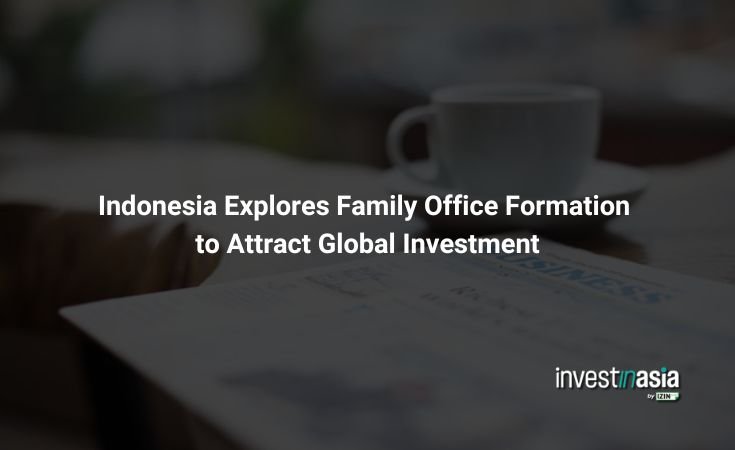In a strategic move to bolster its domestic economy, the Indonesian government is considering the establishment of family offices as a means to attract global wealth and investment. The initiative, spearheaded by Coordinating Minister for Maritime Affairs and Investment, Luhut Binsar Pandjaitan, has already gained approval from President Joko Widodo. The President has tasked Luhut with leading a study on family offices through the formation of a Wealth Management Centre (WMC).
Why Family Offices?
Family offices are specialized financial entities that manage the wealth and financial affairs of ultra-high-net-worth families. These offices offer integrated services such as investment management, financial planning, and wealth administration. With the global population of ultra-wealthy individuals projected to grow significantly—particularly in Asia—Indonesia sees a unique opportunity to position itself as a hub for these family offices.
According to The Wealth Report 2024 by Knight Frank, the global population of ultra-high-net-worth individuals is expected to increase by 28.1% over the next five years, with Asia leading the growth at 38.3% during the 2023-2028 period. Currently, Singapore and Hong Kong are leading bases for family offices, hosting approximately 1,500 and 1,400 offices, respectively. However, recent geopolitical tensions and regulatory changes in Singapore may create uncertainties for investors, presenting Indonesia as a viable alternative.
Also read: 10 Reasons Why You Should Invest in Indonesia
Economic and Strategic Advantages
Indonesia’s strong economic growth, stable political environment, and neutral geopolitical stance make it an attractive destination for global wealth management. Minister of Tourism and Creative Economy, Sandiaga Uno, highlighted the vast potential of the family office market, estimated to manage assets worth around USD 11.7 trillion globally. Should Indonesia succeed in capturing even 5% of these assets, the country could see an inflow of approximately USD 585 billion (around IDR 9.5 trillion).
The benefits of establishing family offices in Indonesia extend beyond capital inflows. Such offices could significantly boost domestic capital circulation, increase gross domestic product (GDP), and create job opportunities through investment and local consumption. Additionally, investments in various economic sectors and infrastructure projects by these family offices would not only generate employment but also drive overall economic growth. Collaboration with the government in developing human resources in the financial sector and supporting philanthropic, educational, and healthcare activities could further strengthen the role of family offices as strategic partners in promoting sustainable economic development and improving public welfare.
Also read: What is BKPM Indonesia: It’s Role for Foreign Direct Investment
Challenges and Risks
Despite the potential benefits, the formation of family offices in Indonesia is not without its challenges. Piter Abdullah, Executive Director of the Research Institute, warns that attracting foreign investment through family offices could lead to issues with the balance of payments. The repatriation of profits (dividend payments) to foreign countries could potentially weaken the Indonesian rupiah.
Moreover, Bhima Yudhistira, Executive Director of the Center of Economic and Law Studies (Celios), raised concerns about the impact of family offices on state revenue. He argues that if family offices are granted tax exemptions, it could complicate the government’s efforts to tax the ultra-wealthy, a crucial aspect of increasing state revenue. The survey by Earth For All 2024 revealed that 86% of Indonesians support the implementation of a wealth tax, emphasizing the importance of progressive taxation for the wealthy to ensure a more equitable distribution of income and a more optimal contribution to state revenue.
In response, Sandiaga Uno clarified that while incoming funds through family offices may be tax-exempt, the wealthy individuals involved would be required to invest in Indonesia, with the resulting business profits subject to taxation.
Another significant risk associated with family offices is the potential for money laundering. The large-scale wealth management and complex transactions inherent to family offices could be exploited for laundering illicit funds. The high level of privacy and cross-jurisdictional operations may also be used to conceal the origins of illegal funds. Additionally, complex ownership structures could be employed to obscure the true identity of asset owners.
While the establishment of family offices in Indonesia holds considerable promise for attracting global investment and driving economic growth, the government must approach this initiative with caution. Mitigating risks like money laundering, tax evasion, and balance of payments issues is vital to harnessing the benefits of family offices while protecting the country’s financial stability and fairness. For foreign investors, Indonesia presents an emerging opportunity for wealth management, but careful consideration of the regulatory landscape will be essential.



